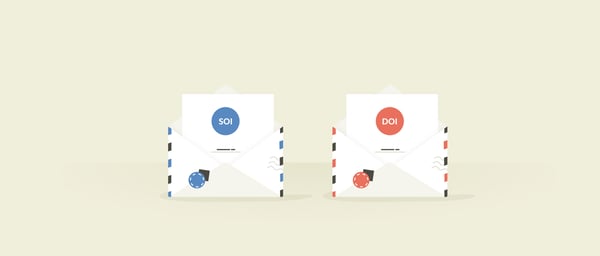Single opt-in vs. double opt-in. It’s a debate that’s been raging on for years among email marketers. Which is best? Which is more conducive to building a quality list of leads? Which will grow your business quicker? And so on.
This is one of the first decisions you’ll need to make when initiating an email marketing campaign.
Therefore, it’s critical that you look at all of the angles and weigh the pros and cons of each approach.
For this post, I’d like to discuss the key differences between single opt-ins vs. double opt-ins so that you’ll know which one makes the most sense for your brand.
Let’s start from the top.
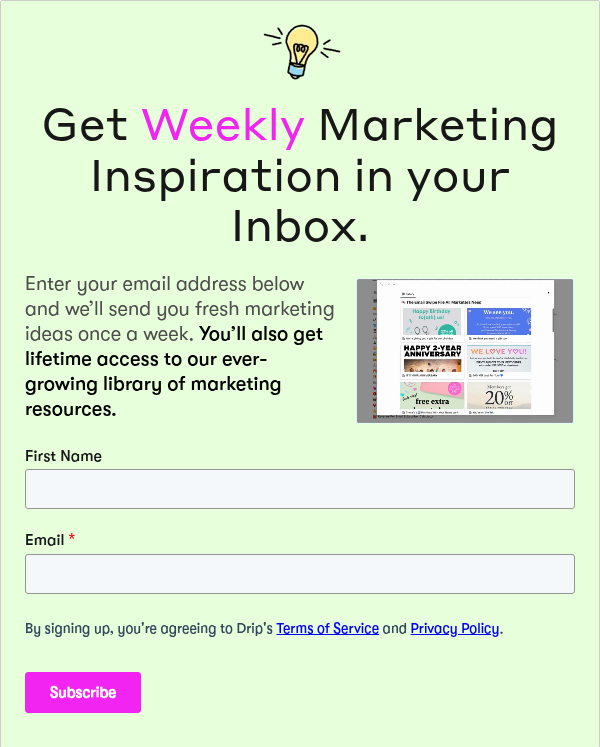
Single Opt-Ins vs. Double Opt-Ins: What’s the Difference?
Just so we’re clear, let me explain the fundamental difference between the two.
A single opt-in is a one-step process and only requires a person to enter their email address one time in the signup box on a website.
No confirmation is required, and they immediately become a subscriber.
A double opt-in involves a two-step process where a person first enters their email in the signup box.
But after that, they receive a confirmation email where they must click to confirm that they want to subscribe before being added to the list.
The key difference is that a single opt-in doesn’t require a confirmation, and a double opt-in does require a confirmation.
Single Opt-Ins vs. Double Opt-Ins Examples
Here’s an example of a single opt-in.
I’m interested in Ray-Ban sunglasses, so I chose to subscribe to their email list.
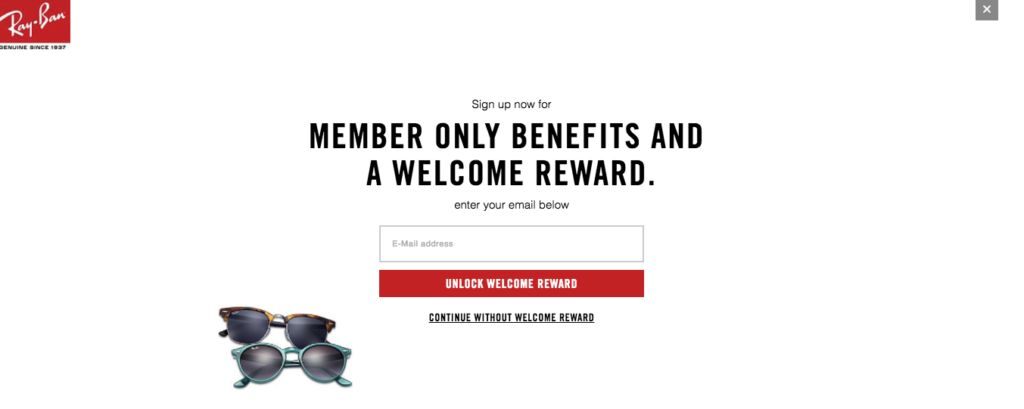
After signing up, I received my first email.
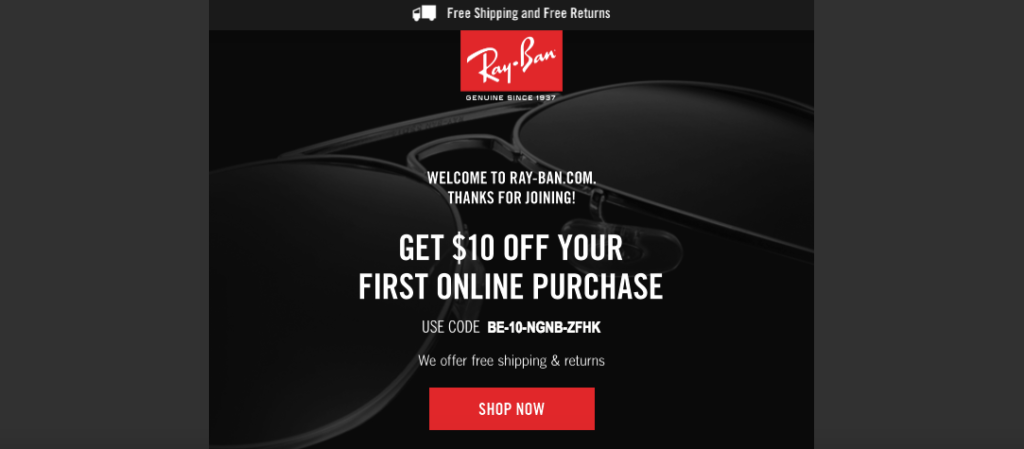
That’s it. I’m all signed up with no further action required on my end.
Notice that there’s no confirmation, and I’m immediately part of their subscriber base.
Now here’s an example of a double opt-in.
Puma has an email signup box where I enter my email address.
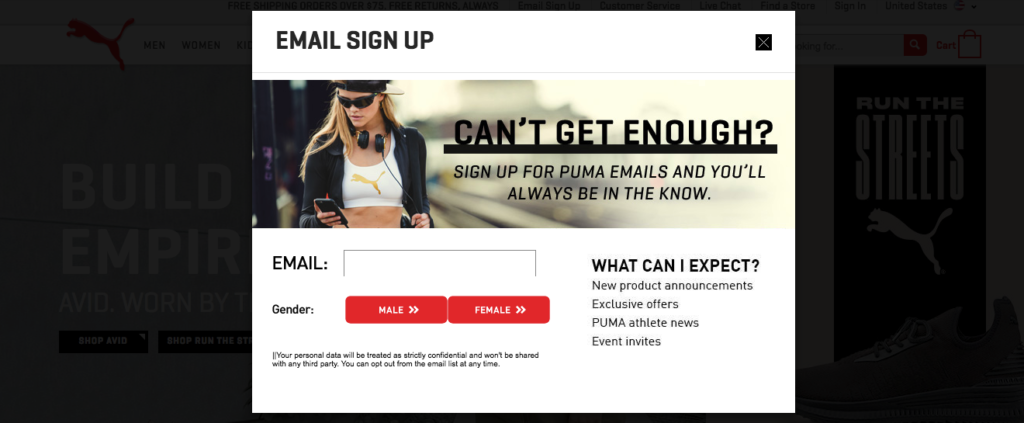
After that, I receive an email where I must confirm my subscription.
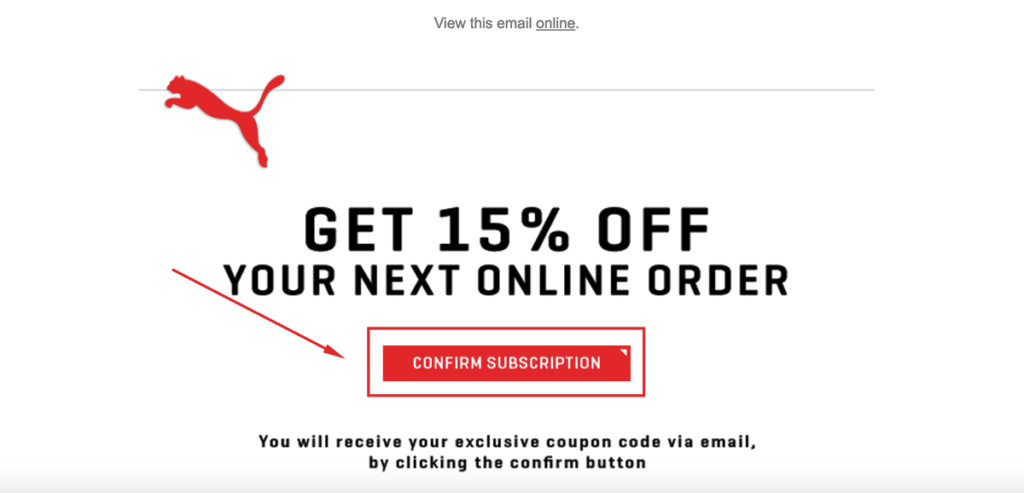
Only after clicking on “confirm subscription” am I officially a subscriber.
The Case for Single Opt-Ins
Perhaps the biggest reason to use a single opt-in is the speed in which you can grow your email list.
Just think about it.
The extra step involved with a double opt-in will inevitably reduce the number of people who complete the signup process.
In fact, GetResponse states, “Marketers generally see about 20-30 percent faster list growth when they use single opt-in.”
They also point out that this roughly equals the average rate of list churn for an email list over the course of a year.
So this is pretty substantial and certainly food for thought.
Going with a single opt-in basically guarantees to help you grow your email list more quickly than using a double opt-in.
While this may not be super important if you’ve already got a large volume of leads coming in from other marketing channels, it certainly can be if you’re a fledgling startup that’s trying to get the ball rolling.
This means you can get your promotions in front of a larger audience and inevitably get more leads coming in.
A Simpler Process
Another benefit is that it’s easier on the user.
Rather than having to look for a confirmation email, open it and click on the confirmation button, a single opt-in only requires the user to enter their email address once. That’s it.
While it may not seem like a big deal to confirm that a person does, in fact, wish to subscribe, it does create some additional steps, which not everyone will be fond of.
Or if someone has an inbox that’s already filled to the brim, the confirmation email may be lost or forgotten about.
In this case, you would end up losing out on a potentially valuable subscriber.
And this is a bigger issue than you may think.
ClickZ references a classic study in 2009 involving Cirque du Soleil whose email list required new subscribers to confirm via a double opt-in message.
Their results found that only 80 percent of people confirmed, meaning that one out of every five would-be subscribers never followed through and made it to the list.
So it’s easy to see how this could adversely impact your email marketing over time.
Twenty percent fewer subscribers greatly reduce your number of leads, conversions, revenue and so on.
It can be a considerable loss.
Also, note that Cirque de Soleil used great messaging and that this number is relatively low when compared with many other campaigns.
In fact, MailChimp conducted their own studies and found that a whopping 61 percent of people never completed the double opt-in signup process.
According to their analysis, the primary reason was due to many people no longer anticipating the confirmation message.
If this happened to your business, it could really reduce the potency of your campaign.
So the bottom line here is that creating an extra step means that a considerable percentage of people will never make it to your email list.
But if you use a single opt-in, it’s a one and done process, which means fewer subscribers will fall through the cracks.
The Case for Double Opt-Ins
One of the main reasons why email marketers choose double opt-ins is that it tends to enhance the quality of their lists.
Why is that?
By requiring confirmation, you know for a fact that people are serious about subscribing to your email list.
It’s not something that happened by mistake, and they’re genuinely interested in receiving emails from you, learning more about your brand and potentially making a purchase.
So moving forward, you’re likely to see a higher open-rate and increased engagement.
Even though your list probably won’t grow as quickly, you can assign a higher average value to your subscribers.
A case study on the Warrior Forum makes another interesting point.
According to their findings, “20 percent or more email addresses from single opt-in could be worthless anyway.”
Why?
“There is a chance that people may mistype their email address. Even if they enter the correct email, they don’t really use that email often because their only intention is to download your freebie on your thank-you page.”
Or if someone has signed up a friend or family member who doesn’t wish to receive your emails, they could potentially accuse you of spam as well.
A double opt-in helps guard against this and ensures that the majority of your leads are rock solid.
And this is huge because if your leads don’t really care, what’s the point?
A Lower Unsubscribe Rate
By ensuring that the people who receive your emails really want them, it’s logical to expect that fewer people will unsubscribe from your email list.
While there’s a bit more involved getting people signed up, your leads should stick around for longer and you’ll have less churn.
Improved Deliverability
As an email marketer, you’re probably aware of how big of an issue spam is.
Just look at the global spam volume as a percentage according to Statista.
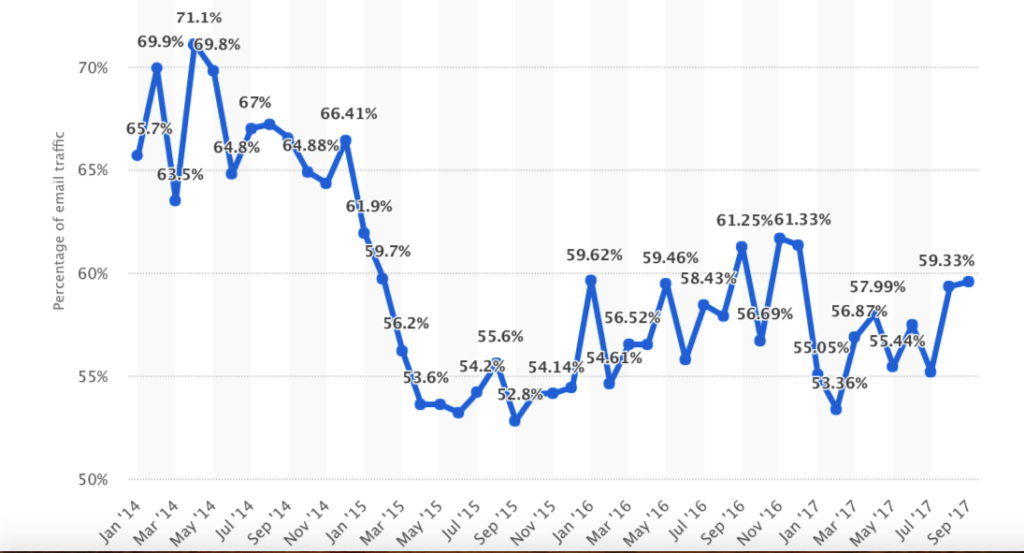
Although it’s dropped considerably over the past few years, it still accounts for the majority of emails people receive at nearly 60 percent as of September 2017.
As a result, ISPs are more diligent than ever about filtering out anything that could be deemed as spam.
Along with that, many people are quick to flag a message as spam if it seems even the least bit questionable.
And this is understandable considering all of the scams and phishing attacks that are happening these days.
The Government of Canada even reports that 156 phishing emails are sent globally every day.
Of those:
- Eight million are opened
- 800,000 links are clicked
- 80,000 people fall for a scam
So you can see why people are wary.
In addition, many people who want to unsubscribe will simply flag a message as spam because it’s quicker and easier than looking for the unsubscribe link and potentially jumping through some other hoops.
I know that I’ve done this before, especially if the unsubscribe button is in some inconspicuous location.
And there’s one last dilemma.
If only a small percentage of your subscribers are opening and engaging with your emails (which is more likely with a single opt-in), it will inevitably reduce your IP’s credibility.
In turn, you run a higher risk of your emails being sent to spam.
But going with a double opt-in, the increased open and engagement rate should bolster the credibility of your IP and reduce the number of times your messages are flagged as spam by recipients.
So in the long run, you can expect a higher deliverability rate.
What Do Other Marketers Have to Say?
I usually find that when making decisions like these, it’s helpful to know what the collective opinion of others is.
So I did some research to see which tactic email marketers prefer on average—single or double opt-ins.
It turns out that it’s pretty even with single opt-ins narrowly beating out double opt-ins.
According to a worldwide poll from Litmus, 53.5 percent of email marketers prefer using a single opt-in and 46.5 percent using a double opt-in.
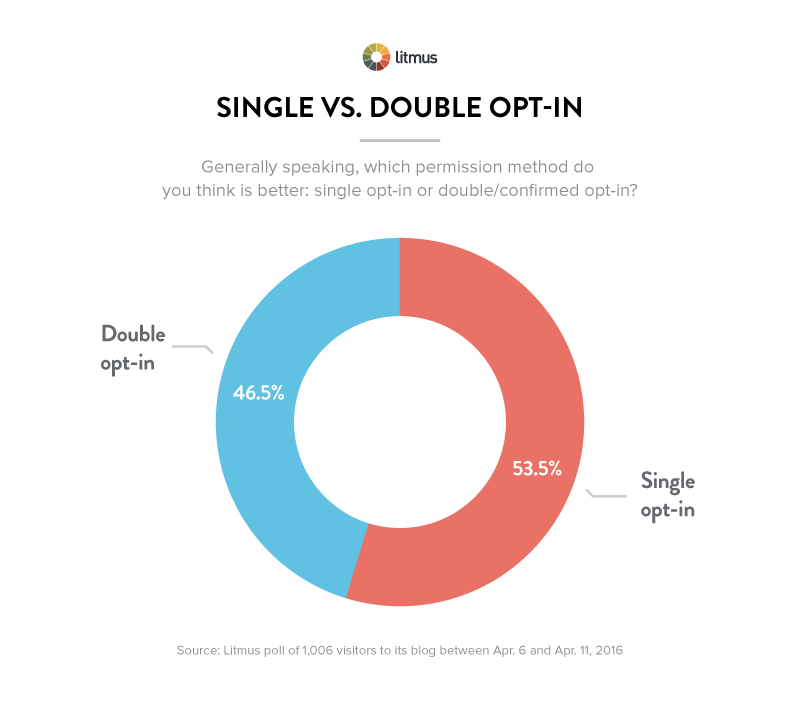
Note that 60 percent of the respondents for this poll were from the US, and there was just a bit more disparity among US-based marketers.
Litmus explains,
Among US respondents, 55 percent said SOI was better, versus 45 percent saying DOI was better. In the rest of the world, the gap was narrower, but the result was the same, with 51 percent saying SOI was better and 49 percent saying DOI was.
So there you have it.
The majority of email marketers prefer single opt-ins, but not by much.
Choosing Your Strategy
There really is no right or wrong option here. Both single and double opt-ins have their merit.
Deciding which tactic is best for your email list really just boils down to your priorities.
If rapid growth is your primary goal and you want to build your list as quickly as possible, then a single opt-in is your best bet.
This should allow you to build your list 20-30 percent quicker and is often the right choice for campaigns that are in their infancy.
But if you’re more concerned with the quality of your leads and want a list that’s highly plugged in and engaged, then a double opt-in would be ideal.
While your list won’t grow quite as quickly and you won’t have quite the same volume of leads upfront, you can be certain that your subscribers are genuinely interested in your brand.
Therefore, you can expect a higher open-rate and increased engagement levels.
If you’ve got leads coming in from other channels and can afford to give it some time, this is usually the way to go.
Experimenting
Still not sure which approach to take?
I would recommend doing a bit of experimentation to see what works best.
For instance, you might want to start with single opt-in for a month and monitor metrics like:
- How many subscribers you get
- What your open-rate is
- How much engagement your emails receive
- Conversions
Then for the second month, switch to double opt-in and do the same.
If there’s not a significant drop off in your volume of subscribers, you’ll probably want to stick with double opt-in.
After all, those subscribers will be of higher value on your average.
But if you do notice a major drop off, you’ll probably just want to use single opt in moving forward.
Or at least until you’ve got a sizable list.

Conclusion
There is a myriad of factors to consider when choosing between single and double opt-ins.
But the way I see it, it essentially boils down to whether you’re going for quality or quantity.
If it’s quality, double opt-in is the best way to go.
Although your list will be smaller, the average value of a subscriber should be considerably higher.
If you’re going for quantity, then it’s single opt-in all the way because your list should experience 20-30 percent faster growth.

